Disclosure: FMB Home Picks is committed to delivering independent advice and reviews on home products and services. When you purchase through links on our site, we may earn an affiliate commission. Learn more Contact us.
Our handy guide explores the best double glazing windows companies in the UK, as well as the costs and benefits of installing double glazing in your home.
Solid reputations and outstanding customer service are what set the best double glazing companies apart. The best double glazing installers offer energy efficiency, security, durable construction, competitive pricing and solid warranties.
Our experts have compared double glazing companies across the UK, assessing their windows prices, reputation, customer service and product quality. Anglian is our top choice overall, while other installers, including Britelite and Britannia, also offer a good customer experience.
For a quick double glazing quote, just fill in your details below, and we will connect you with installers near you.
Our experts have researched double glazing installers extensively, comparing their prices, warranties, energy efficiency ratings and range of window materials, styles and features. After considering the most recent Trustpilot reviews and ratings, we put together the following list of the 3 best double glazing installers in the UK.
| Double glazing company | Price range per window | Trustpilot rating | Guarantee | Range of materials | Secured by Design certified | Energy rating |
|---|---|---|---|---|---|---|
| Anglian | £250–£910 | 3.9 stars | 10-year guarantee for all parts and labour, 10 – 15 years for gas-filled windows | uPVC, aluminium, wood | Yes | A++ for uPVC; A or B for timber; B for aluminium |
| Britelite | From £527 | 4.3 stars | 10-year transferable guarantee | uPVC, aluminium | Yes (some products) | A+ for uPVC and aluminium |
| Britannia | £250–£605 | 3.9 stars | 10-year transferable guarantee | uPVC, aluminium | Yes | A+ or A++ for uPVC and aluminium |
Get windows quotes in your area
Discover how much new windows would cost for your home by answering a few quick questions
Our experts considered the following factors when assessing the best double glazing companies:

Windows companies offer different terms and durations when guaranteeing their products. The shortest guarantee period featured in this guide is 10 years. This is about half the average lifespan of double glazing.

The cost of double glazing windows can vary widely. Variables include your chosen supplier, window dimensions and window frame material. Even after factoring in double glazing grants, the price can be steep, so we’ve included indicative costs for each supplier.

Installing double glazing can improve your home’s energy efficiency, save you £235 on your annual energy bills and boost the value of your property. To maximise these benefits, we researched the energy efficiency ratings of each company’s windows.

Most of the companies we’ve chosen install double glazed windows accredited by Secured by Design (SBD). This means that manufacturers meet police-approved security considerations throughout the design and manufacturing process.
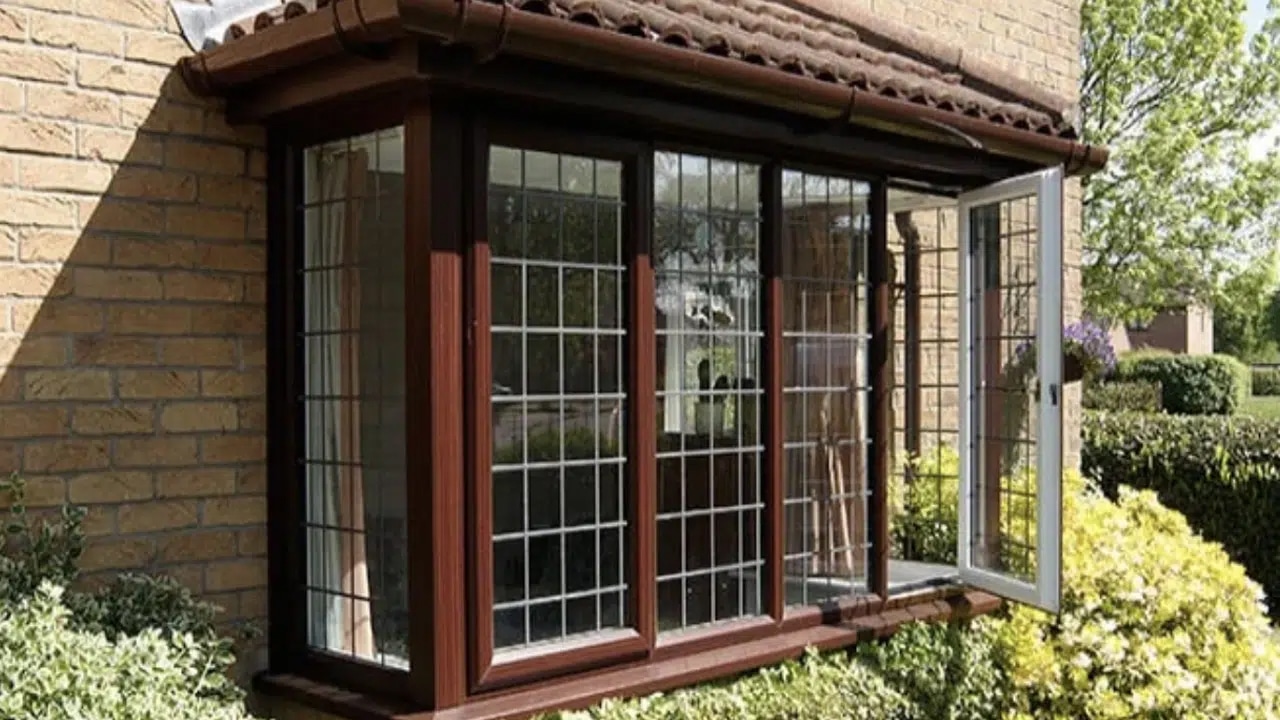
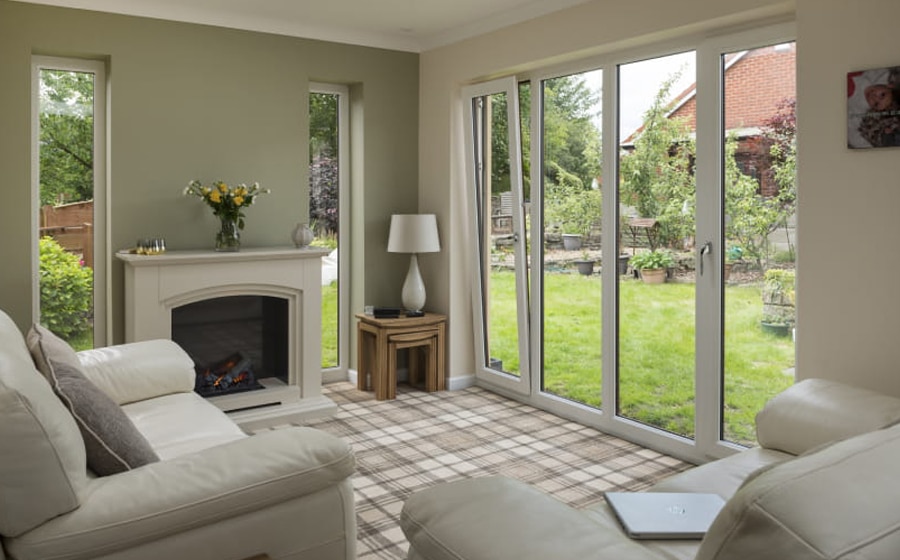
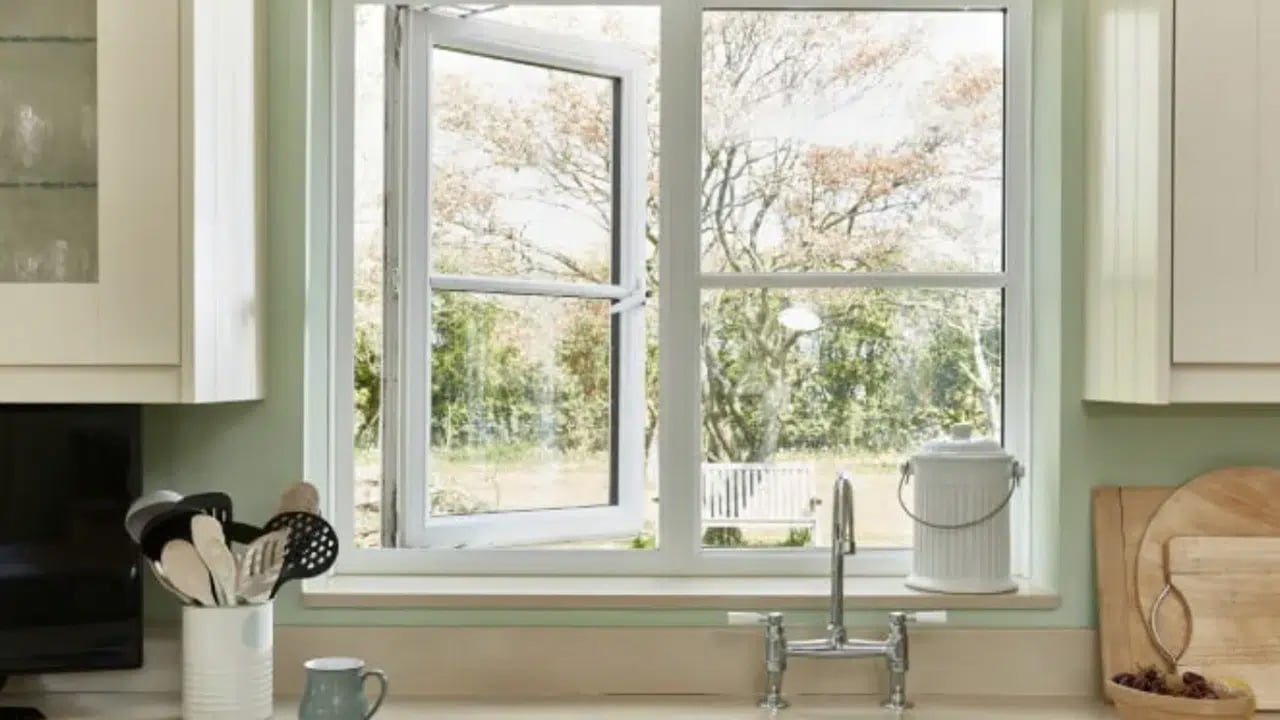
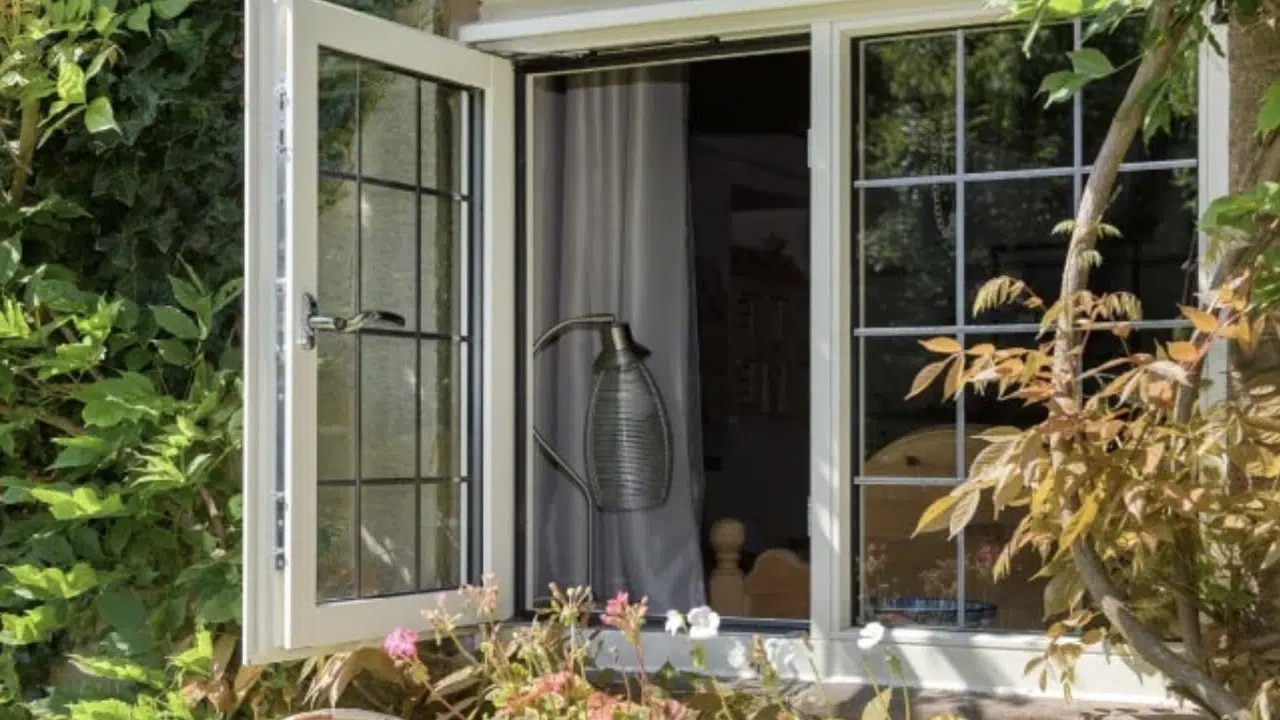
Anglian offers homeowners a variety of energy-efficient windows styles and materials, including uPVC windows in several finishes, as well as wood and aluminium. Decorative glass options and advanced safety features, including shoot bolt locks, key locking handles, excluder devices and multipoint locks, are also available.
Founded as Anglian Windows in the 1960s and considered a market leader, the company fits more than half a million products in the UK every year. Anglian prioritises economic and environmental sustainability. All of its products bear the Made in Britain trademark, and the company takes part in the Recovinyl Plus PVC recycling initiative.
Anglian’s fair payment options, bespoke design choices, impressive accreditations and glowing reviews led us to award the company excellent marks for its double glazing products and services. It offers a variety of styles, including casement, flush, cottage, sash, bay and tilt and turn windows. Buyers can also choose from a variety of Scandinavian-inspired styles and colours, including uPVC frames with wood finishes.
Like many double glazing companies, Anglian doesn’t have a public price list, but customers can request a free quote through its website. Our research revealed the average cost of a 60cm x 90cm window runs as follows:
| Material | Cost |
|---|---|
| uPVC | £250–£570 |
| Aluminium | £500–£605 |
| Composite | £575–£625 |
| Wood | £845–£910 |
Anglian’s bespoke and beautifully designed products in a variety of styles are most suitable for cash buyers. Although it offers some financing options, its 11.9% APR is not as favourable as the rates from some of its competitors. Brands such as Britannia bring interest-free credit and “buy now, pay later” plans to the table.
Buyers concerned about security will appreciate Anglian’s safety features, especially its locking systems and highly coveted SBD accreditations. The company’s wood windows and doors hold several accreditations and licences, including Forest Stewardship Council certifications. Anglian’s versatility, pricing, payment options, solid guarantees and excellent reviews and ratings make it our choice for the best double glazing company overall.
Read our full Anglian windows review.
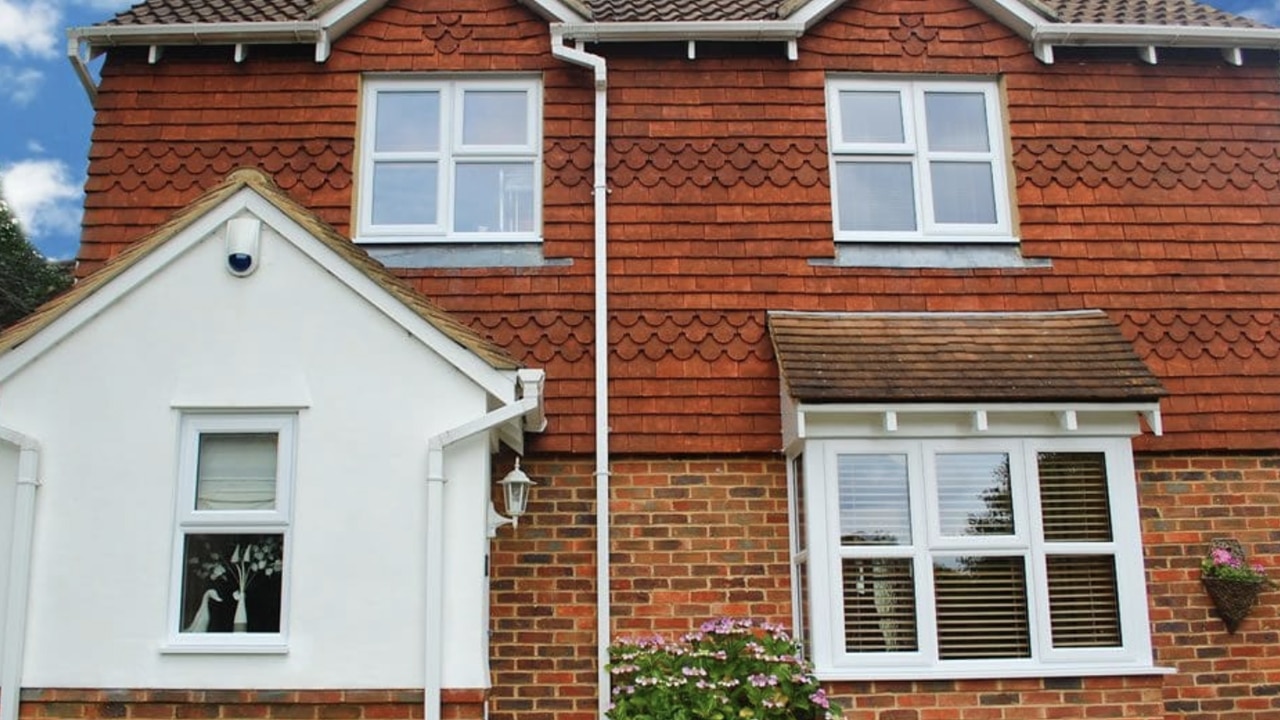
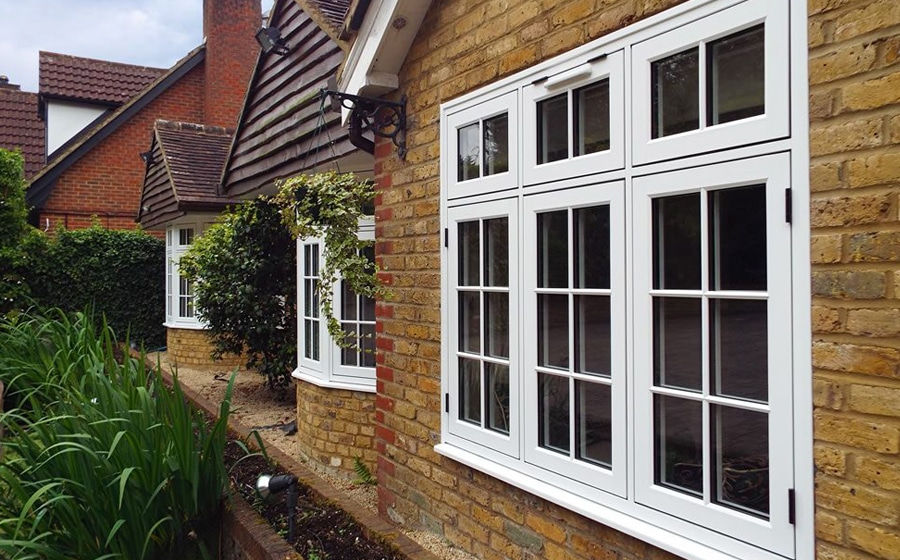
With over 50 years in the double glazing industry, Britelite Windows focuses on energy efficiency and security – as demonstrated by its offer of a 10-point lock system. The company’s accreditations include the BSI Kitemark for window installation.
Britelite’s price transparency policy is one of the reasons the company earned a place on our shortlist. There are no hidden fees, and quotes always includeVAT and fitting costs. Many online reviews claim that Britelite’s double glazing prices are more affordable than those of its competitors – and numerous customers have seen impressive energy savings post-installation.
No price lists are available online, but Britelite gave our researchers its average prices for a standard casement window:
| Material | Cost |
|---|---|
| uPVC | £527 |
| Aluminium | £1,050 |
Britelite Windows is a good option for budget-conscious homeowners who want to avoid any hidden fees. The company’s pricing is competitive and transparent, and the quote you get is the VAT-inclusive price you’ll pay, which makes it easier to make a decision upfront without worrying about additional costs. Unlike some of its competitors, Britelite is praised by online reviewers for its simple and straightforward sales tactics. Buyers also enjoy cost savings through impressive energy efficiency after installation.
On the downside, Britelite doesn’t offer a great variety of payment options. But its monthly financing option is fairer than most, with a representative APR of 8.9%. The company doesn’t offer many frills in terms of materials or design features, and it offers a standard 10-year warranty.
Read our full Britelite windows review.
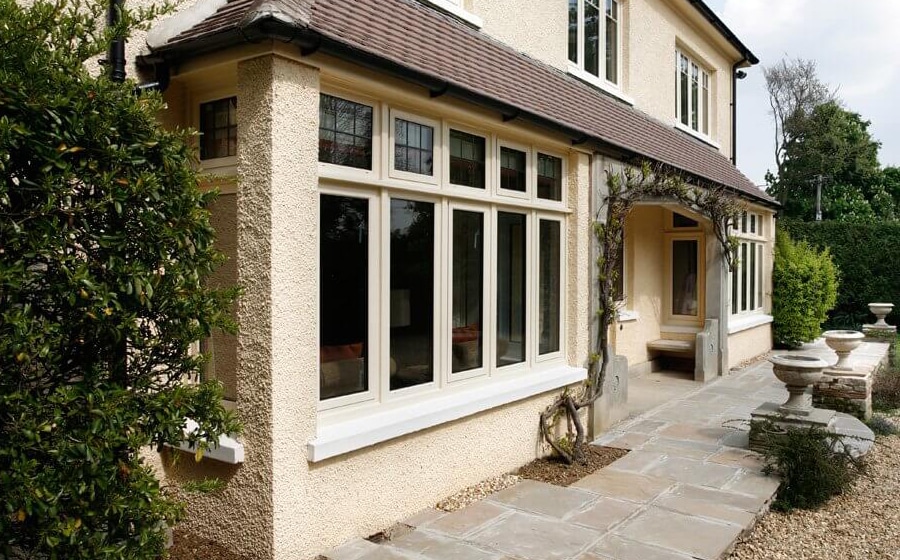
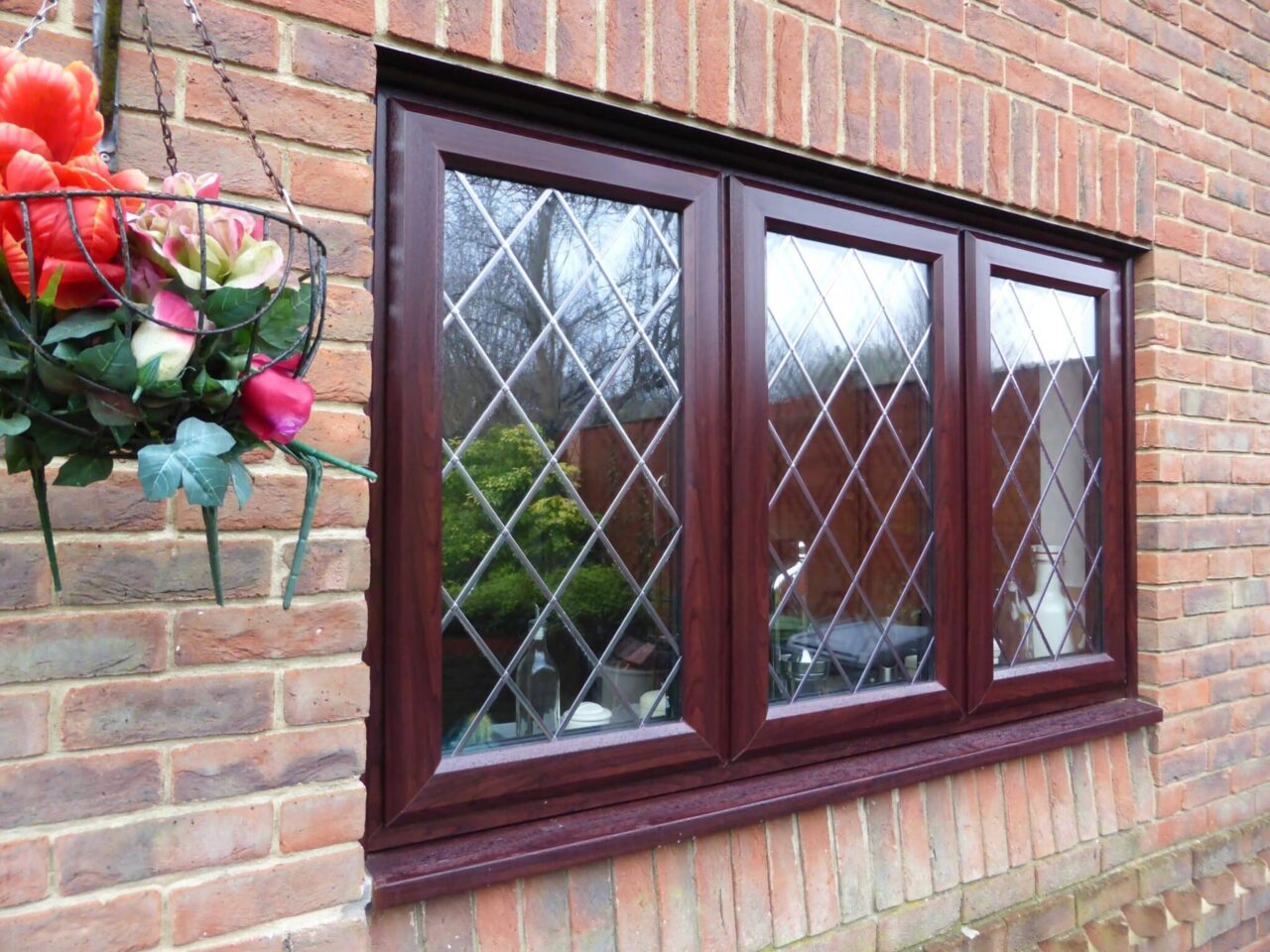
A well-known family business founded in 1982, Britannia Windows serves customers in Kent, Sussex, Essex, Surrey and London. This double glazing installer gets mixed reviews online, but its reputation is solid overall. It addresses negative reviews head-on and uses a network of installers to ensure quick delivery. Its extended contact centre service hours (Monday to Friday, 8.00am to 8.00pm) are another advantage for busy homeowners.
With extremely flexible payment terms and multiple finance options, Britannia is an attractive option for buyers who want to use credit. It also has an extensive range of window designs, colours and styles.
Pricing is not available online, but thanks to customer reviews, we were able to identify a price range. Costs are generally on par with those of Anglian, and most reviewers rate Britannia’s prices as “fair” or “reasonable”.”.
| Material | Cost |
|---|---|
| uPVC | £250–£500 |
| Aluminium | £500–£605 |
New windows are a significant investment, and many homeowners depend on payment plans for such large purchases. Britannia Windows is a good option for these buyers, with low-cost monthly financing, a buy now, pay later repayment scheme and 0% APR on purchases over £3,000.
Britannia has attractive showrooms in convenient locations around South East England. With a reputation for friendly service and efficient installation, the company is a solid all-round option. Although Britannia is a smaller business than some of the others on our list, it offers an impressive range of window designs and colours.
Read our full Britannia Windows review.
To assess the best double glazing companies, we used a scoring system based on some key aspects to consider when choosing an installer. We rated each company against these criteria for a total score out of 100.
Factors included:
A quick way to request multiple double glazing quotes so you can compare them is to fill out our simple form.
Most homeowners apply for double glazing quotes only once every few decades, which can make it difficult to get the maximum benefit out of the process.
To get some expert insight, we spoke to Rebecca Orde, a project manager specialising in residential development. She frequently obtains quotes for double glazing installation on behalf of her time-strapped clients.
According to Rebecca, a key benefit of the quotation process is getting a detailed breakdown of what goes into a double glazing installation and what the associated costs are.
“You’ll find with most medium-sized double glazing companies that they have the software to provide really detailed quotes, including specifications such as U-value, size, material, the gas used between the panes and so on. It’s really helpful getting that in-depth overview, as well as a price,” she says.
Rebecca recommends contacting multiple FENSA- or CERTASS-approved installers for a costing.
“Obtaining 2 or 3 quotes from different installers is ideal for most customers, assuming you’re talking to companies of known quality,” she says.
“Sometimes, you might not even hear back from a certain installer. In some locations there’s an awful lot of building work, so it’s a seller’s market.”
Further to Rebecca’s advice, we recommend gathering quotes from both national and local double glazing installers so you can compare the prices given, including the cost of labour. Some national window companies may subcontract your job to a local installer, but it’s well worth getting quotes from both parties so you can compare their pricing.
Before you start contacting installers, decide on the following key specs so you can get accurate cost estimates.
Keep an open mind about your installation timeline. Double glazing companies can get busy at specific times of the year, so it’s best to plan ahead and understand that your installation might not happen right away. The earlier you can book your job, the better.
When discussing a double glazing quote with an installer, it’s a good idea to ask some questions to establish the company’s reliability and expertise.
Choosing a local double glazing installer near you has some advantages. Crucially, a friend or relative may have experience with the same company. However, we wouldn’t necessarily recommend taking advice from strangers in local social media groups.
Getting a good read on a double glazing installer’s service quality matters. There are plenty of horror stories about ineffective fittings, noisy vents and property damage resulting from careless work.
As we noted previously, it’s best to gather quotes from both national and local windows installers. Most of them supply the same or similar products, so you should focus on company reputation and customer service when comparing prospective providers. Before choosing an installer, consider the following factors.
Look for a company that has been in business for several years – the longer, the better. Longevity is a good indicator of expertise and reliability, both of which are valuable during installation and ongoing support.
Read all the customer reviews and testimonials you can on third-party websites before choosing an installer. Some negative reviews are inevitable, but the company’s response to criticism will give you an insight into their level of professionalism. If they show willingness to put right any issues, you can assume their aftercare service is up to scratch. You can usually take an argumentative response as a warning sign.
Local installers might keep photos of their completed projects to show prospective customers. They might even be able to tell you which houses in your neighbourhood they’ve worked on so you can have a look at the quality of the windows and installation for yourself. Look for a gallery or portfolio page on the company’s website, and find their social media profiles to search for examples of their completed work.
Always ensure the company is FENSA-registered and compliant with building regulations. This will save you time and money because the company will register your window installation for you. It will also give you peace of mind knowing that the company has been thoroughly vetted. The company should provide a FENSA certificate upon completing your double glazing installation.
Windows can be an easy access point for burglars. Ensure that your installer provides a multipoint lock system or other security measures that protect your home.
All UK glaziers must offer a minimum 10-year guarantee on their labour and materials. Longer guarantee periods are even better.
Make sure the installer provides a free quote with no obligation. Value for money and price transparency are important. It’s not unusual for companies to inspect a home before providing a quote, but they shouldn’t charge for every little inspection or hide extra costs in the fine print.
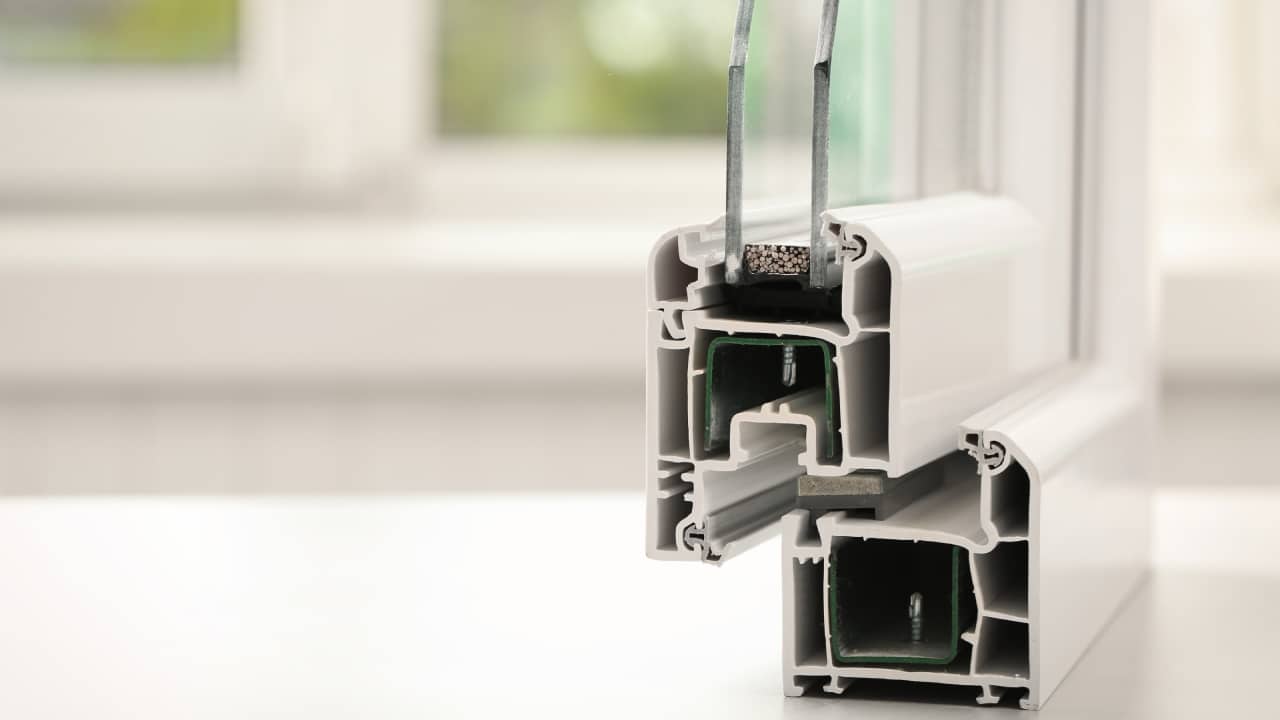
Before you select a company to install your windows, it’s helpful to understand how double glazing works. Double glazed windows feature 2 glass panes separated by spacer bars, with air or gas in between. This provides excellent insulation and stops draughts. Popular since the 1970s, double glazing warms a home by trapping heat from sunlight inside. This reduces energy costs and the need for fossil fuel heating.
Double glazing helps keep your home warm by letting sunlight enter your rooms through your window panes. Once inside, the heat turns into long-wave infrared energy, which can’t escape through the glass, keeping your home cosy.
The passive warmth that remains inside your house is known as solar gain. It heats the space through a process similar to the greenhouse effect. By reducing the need to burn fossil fuels for heating, double glazing decreases a household’s energy bills and carbon footprint.
The cost of double glazing depends on several factors, including the number of windows you need, the company you select and the window style you choose. uPVC windows made of engineered plastic are generally the most affordable option, followed by aluminium. The most expensive option is typically timber windows.
As the average UK property has 10 windows, the costs can add up quickly. The table below provides approximate costs based on the cheapest and most expensive windows installers’ prices per unit. To determine whether a company fits your budget, multiply these prices by the number of windows you want to install.
| Material | Anglian | Britelite | Britannia |
|---|---|---|---|
| uPVC | £250–£570 (A++ rated) | £160–£450 (A++ rated) | £250–£500 |
| Wood | £845–£910 | Unavailable | Unavailable |
| Wood clad | £575–£625 | £475–£625 | £475–£625 |
| Aluminium | £500–£605 | £500–£605 | £500–£605 |
The cost of installing double glazed windows varies substantially depending on the material, style, size and company you choose.
Our analysis compares the prices for 1 double glazed window unit of approximately 60cm x 90cm in different materials. The highest price corresponds to the highest rating the company offers.
| Material | Anglian | Safestyle | Britelite | Britannia |
|---|---|---|---|---|
| uPVC | £250–£570 (A++ rated) | £250–£570 (A rated) | £160–£450 (A++ rated) | £250–£500 |
| Wood | £845–£910 | Unavailable | Unavailable | Unavailable |
| Wood clad | £575–£625 | Unavailable | £475–£625 | £475–£625 |
| Aluminium | £500–£605 | Unavailable | £500–£605 | £500–£605 |
In this video, we explain the benefits of double glazing and the savings it can help you achieve. Watch for advice on how to get financial help to pay for an installation and what to do if your windows need repair or replacement.
In this video, we explain the benefits of double glazing and the savings you can achieve by choosing it. Watch for advice on how to get financial help to pay for an installation and what to do if you need to fix or replace your windows.
Double glazing technology has significantly advanced in the past 20 years, offering longer-lasting and higher-performing windows. Key improvements include:
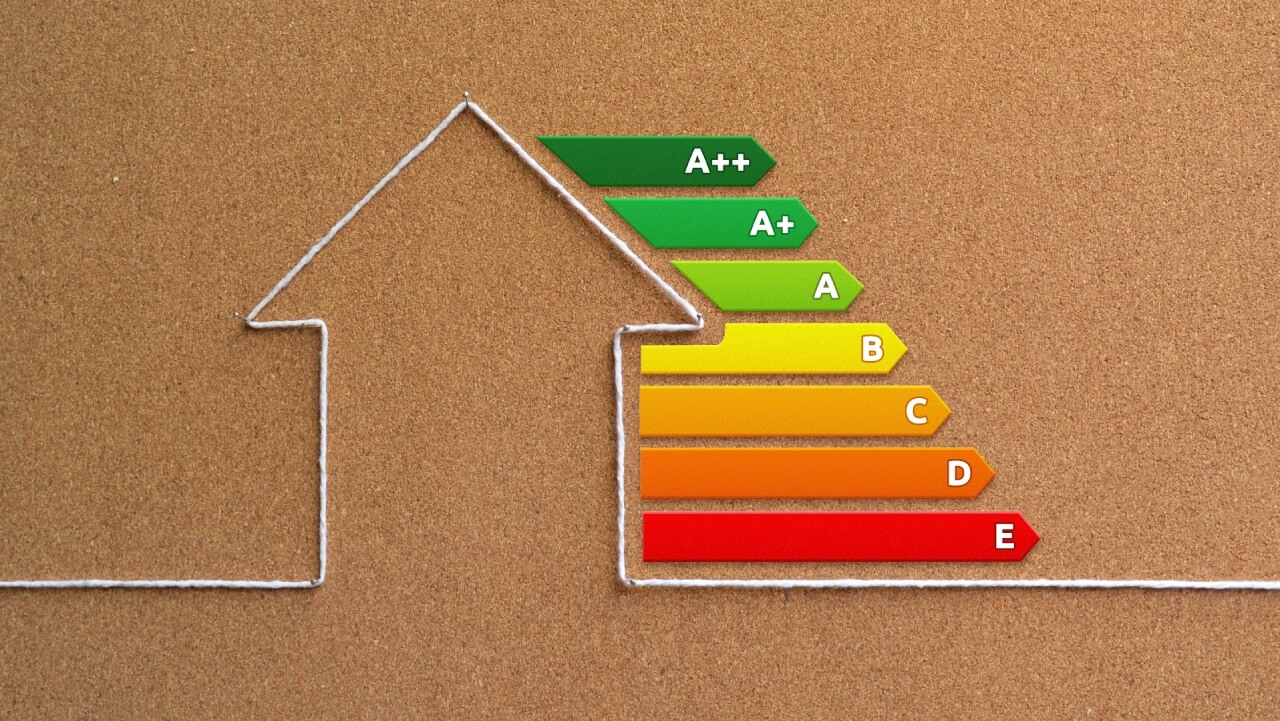
Double glazing units receive an energy efficiency grade based on their ability to keep your house warm and lower your heating bills. The letter-based scale is much like the one used to rate most white goods, with E being the least efficient and A++ being the most.
The British Fenestration Rating Council considers every double glazing component during its rating process, including the glass, the gas that’s used to fill the spacing and the manufacturing quality of the unit.
According to the latest building regulations, all new windows should have a grade of C or higher.
A number of different organisations, such as FENSA, regulate UK double glazing companies. FENSA is a government-authorised industry watchdog that monitors businesses’ compliance with building regulations and accredits qualifying companies as FENSA-approved installers.
Certass is another government-approved body providing certification to window installation companies based on their performance against agreed standards. FENSA and Certass have slightly different acceptance requirements, but membership in either body indicates that a window installer provides a safe and lawful service.
The Consumer Rights Act 2015 requires double glazing companies to carry out work on your installation “with reasonable care and skill” and provide windows “of satisfactory quality”. Furthermore, the windows must be “as described”, meaning their quality and specifications must match the order agreed upon.
If your double glazing installation doesn’t fit these criteria, the installer is in breach of contract. You have the right to demand that they repair or replace the windows.
Reputable double glazing companies offer generous warranties on their installations, sometimes exceeding 10 years, although cover periods can vary between components, including window panes and window frames. Check the business’s guarantee terms before you commission any installation work.
Some of the UK’s leading double glazing installers have recently entered administration, including Safestyle in 2023 and Everest in 2024. In these circumstances, it’s unclear whether the ongoing care of their double glazed windows will continue.
If no buyer steps up to take on the window installation company’s obligations and customers, then the guarantees on its customers’ double glazing are likely to become unclaimable. However, customers who received Insurance Backed Guarantee policies upon commissioning their installations might be able to make claims on their guarantees via their insurers.
According to VELUX, the cost of replacing a roof window is around £980, assuming a like-for-like switch. If you plan to install a larger window or add a new window to a space that doesn’t have one, the price will be higher. Installers’ rates will vary depending on the labour and materials involved in the installation.
Budget-conscious homeowners sometimes seek out window businesses that install secondary glazing. This process involves adding second glazed units to the interior sides of existing single glazed windows. The secondary glazing is fully independent and doesn’t form a sealed unit with the existing glazing. Secondary glazing is often attractively priced, but it’s generally not as insulative as double glazing. Furthermore, it doesn’t prevent condensation build-up or enhance your property’s security. On the plus side, secondary glazing is highly effective at sound insulation – sometimes more so than double glazing.
The choice between double or triple glazed windows is partly a matter of how much money you’re willing and able to spend. Triple glazed units, which are about 20% more expensive than double glazed ones, consist of three panes of glass. Spaces filled with air or an effective insulator gas, such as argon, separate the panes. As with double glazing, triple glazed window panes and gas-filled spaces are set in sealed frame units.
There’s a growing demand for triple glazing, which offers the same advantages as double glazing but to an even greater extent. With two spaces, or “airlocks”, between the three panes, triple glazed windows can increase your energy-efficiency savings by as much as 50%.